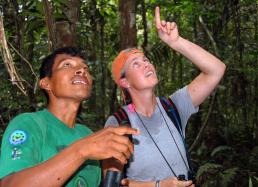In the News
Keep up on the latest headlines featuring Dr. Vriesendorp and her colleagues in The Field Museum's department of Environment, Conservation, and Culture (ECCo)—watch related videos, and take a look at articles about the team's work in the Amazon!
VIDEOS
"Rapid Inventory" Video: In a video from our Abbott Hall of Conservation: Restoring Earth exhibition, learn more about The Field Museum's ECCo department and how our scientists conduct Rapid Inventories in the Amazon Basin.
"The Shipibo: Protecting Cordillera Azul" Video: Check out another video from our Abbott Hall of Conservation: Restoring Earth exhibition to discover how traditional crafts help the Shipibo people maintain both their way of life and the Amazonian forests of Peru.
PRESS RELEASES
"Lavishly Illustrated Guide to Peru's Birds Describes 1,800 Species" Press Release: Check out the landmark publication, Birds of Peru, authored by conservation ecologists and ornithologists in the Field Museum's ECCo program. Not just a birdwatcher's manual, the guide is also a useful tool for the Peruvian people working to protect the tremendous natural biological wealth of their country.


